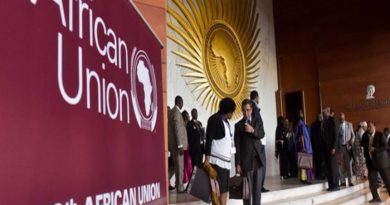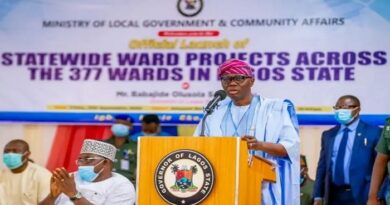“No Premium No Cover” policy forces airlines to adopt monthly insurance cover–Agbeja
An insurance broker with over 35 years experience in the insurance industry, Mr. Babajide Olatunde-Agbeja is the Chairman/CEO, Boff & Company Insurance Brokers Limited, a firm based in Ibadan, Oyo State. In this interview with ABDUL OLALEKAN KHALIQ, he said the implementation of “No Premium No Cover” policy forces airlines to abandon annual cover for monthly insurance cover, to avert grounding their airlines, citing Arik Air as a case study. He also speaks on other burning issues in the insurance sector.
In the aviation industry, operators are now seeking for monthly insurance cover. Is this the best alternative?
Monthly cover in the aviation industry started with the implementation of the “No Premium No Cover” (NPNC). Some of them pay millions of dollar as insurance premium, but in the developed world, credit facility is key. You need to have credit to operate.
In the developed world, you have specialised companies that formed insurance premium. That is their work. But in Nigeria, the law says no premium no cover, meaning, you are supposed to prepay your premium. So, what we have is a wholistic policy or a wholistic reinsurance cover for the year. You will still have an annual cover but because the law says no premium no cover and you must comply with the law, you then pay every month, quarterly or biannual as you can afford it. It is better for you to pay every month than to close shops.
Look at what happened to Arik Air sometimes ago, they couldn’t fly as their insurance cover was not in place because of public holiday on Monday and Tuesday. So, by the time it expired, they have to ground all their aircrafts.
But immediately NAICOM opened on Tuesday, they gave them the permission to place abroad so that they could fly. So, it is important to be proactive and plan ahead for your insurance cover, especially when your aircraft is flying, carrying hundreds of people every day. You must protect them, you must have insurance. Hence, paying monthly premium is not against the law, so long as you prepay. It can be monthly, quarterly, biannual or annual cover. You still have that wholistic policy that covers you for the year, which is your reinsurance.
It seems subscription to life insurance is very low in Nigeria compared to South Africa. What is responsible for this?
Nigeria is entirely a religious country. I read a write-up recently linking religion and economic development. The highly developed economies are not very religious. The developing economies are highly religious and that is where Nigeria fits into. We are highly religious and highly corrupt. So, life insurance is not popular here because Muslims believe Allah gives and takes. To them, if God takes me away tomorrow, He will provide for my children and my family, so, I don’t need insurance. But, I can only say you need insurance. If you have education insurance and you die, all your children will be educated. It won’t be because you are dead, your children starts to hawk things on the street.
Life insurance is so important, and I am happy it is made compulsory for those with three or more employees. In South Africa, they are more developed than Nigeria, in this aspect. If we can limit corruption and being over-religion, we will grow as a nation and our demand for insurance will increase.
Do you think multinational companies subscribe to the needed compulsory insurances, judging from your interactions with them?
Yes, the multinationals have insurance. They complied because they can afford it. They, in most cases, deal with government and government has a way of cross-checking insurance in bidding for government businesses. All your bidding documents require you to submit group life policy, third party motor policy and so on, so they have no option than to comply.
It is the ordinary members of the public that don’t comply. In Nigeria, we have about 14 million cars, let’s even say we have 10 million cars, and only three to four million cars are insured. If you do a calculation of the seven million cars that are uninsured, multiply by N5,000, you will be amazed with what insurance industry is losing on yearly basis.
If the industry can get this huge fund, it will increase its contribution to GDP, have more funds to increase insurance awareness, engage in more CSR projects, among other beneficial projects.
If you have third party motor insurance, immediately you are involved in an accident, your insurer will pay third party claims to the tune of N1 million for a N5,000 premium. So, if you hit somebody’s car from the rare, you need not to worry. Just say I am sorry, it’s a mistake to the driver. Tell him, this is my insurance cover, my insurance broker will call you and fix it, simple and within a week, the damaged car will be repaired.
Are you proposing that people should not buy insurance unless they go through insurance brokers?
Yes, I want insurance broking law to be implemented so that all the insurances in Nigeria can be made to pass through insurance brokers. There is no insurance broker that is not insurance professional. By law, you can’t even set up a broking firm except by ACII, that is, the Associate of the Chartered Insurance Institute, by examination, whereas, you can set up an insurance company as a business. So, an insurance company is set up to make profit. They want the issues of claims to be minimal so that they can make their profit and when they can get away with it illegally, they will do so.
But if it’s a broker, which is your own consultant, he will be fighting your case on your behalf permanently. We (insurance brokers) are not getting paid by the insuring public; we get paid by insurance law. We get our brokerage fees from the N5,000 you paid on third party, without getting extra. Whereas, as brokers, we can also help you get discount on these policies. We can combine you into a fleet and still give you 10 to 20 per cent discount which you don’t know about but we know about it.
Moreover, when you bring your business to us, we know which insurance company is outstanding in these different areas of insurances, so that you don’t put all your eggs in one basket. We will share your risks between two, three to five insurance companies. So, whichever line of business you are in, we know which company best suits you.
If we are that good, why the insuring public won’t be allowed to use insurance brokers? So, why won’t it be made a law, it is to the advantage of the public.
The National Insurance Commission (NAICOM) is planning to extend the implementation of 10-year tenure for CEO of insurance brokers. Having managed this company for the last 25 years, what is your reaction to this?
The 10 years tenure cannot work in a professional setup. It can work in a business or conglomerates but in a professional setup like law, architecture and insurance brokerage, the older you are, the more matured you are in the system. Why will you say somebody who has spent up to 10 years should go home and sleep, when he is a professional? Somebody who has had 35 years experience in the industry is a professional. One of my directors can do a research on political violence from his experience and the board contributes to it, hence coming out with something new. Where NAICOM should be looking at is the non-executive director, so that others can also come in and help out. We have so many good brains in the country, so, after spending 10 years on the board, you can say, let’s give room for others to come in, though that is only applicable to a public company. When you are a public company, the tenure limit could be implemented because the public owns you. May be you have about 5,000 shareholders, the tenure limit could be adopted to give room for other shareholders to come on board than for one person to be there for 25 to 35 years.
In a professional set up, the older you are the better. If you go to the lawyers, when you see the Senior Advocate of Nigeria (SANs) in their ragged robes, they say the tore robe shows maturity that the man has been wearing that robes for let’s say 35 years. It doesn’t show that the man is dirty, his suit is impeccable, the man is wearing a $2,000 suit, but wearing an old robe. And when he walks to court, you see the young lawyers stepping back to give room for SANs to sit in front. In court, only the very old SANs are allowed to sit in front row and the judge recognises them because they recognise their brains and maturity. So, I don’t think the NAICOM initiative can work in a professional set up.
The broking firms in the country are going through a tough time now, especially, as insurers are also working hard to go for insurance businesses themselves. What will be your assessment of the brokerage industry in the next five years, also considering that regulation is tough on your other colleagues?
If you are good broker, people will always look for you. Remember that Boff & Company don’t always advertise, but yet we are performing well.
Though, direct marketing might have evolved in the next five years, but insurance brokerage, especially the big broking firms would still be relevant.
An airline will be stupid to go directly to an insurance company, so also is a factory using a boiler. This is because the risks are so intricate, interwoven and peculiar, which requires the expertise of a broker. Yes, in five years time, there will be direct marketing, and retail products that will lead to the death of some insurance broking firms, but the big ones will survive.
For instance, in Boff & Company, we have caught a niche for ourselves, by looking at where our services are most needed. If a new business starts up today, what happens in most cases is that they will invite an insurance broking firm. If an insurance company is invited, they will only give them what they have to sell, but an insurance broker will give them what they need. They can only sell what they have, they can’t sell what they don’t have and not all insurance companies do all policies. It is the brokers that will decide what you need.
So, I don’t see any competition with insurance companies and at Boff & Co, we are proactive, we stay and think a step ahead of competition. For instance, when the Federal Government unbundled the power sector and sold them to 11 DISCOs, we contacted all of them and we have many of them on our books. I don’t want to sound boastful, but those are the proactive ways we think. As we see new companies, projects coming upstream, we reach out to them, telling them why they need us and in most cases, they accepted us. They either come with us or go with the existing brokers, if they had before.
What will be your advice for the young brokerage firms to survive the tough operating environment?
Someone with integrity and professionalism will succeed. First of all, you must be of high integrity; broking is about integrity because we are saying trust me. Action speaks louder than voice.
We have a major claim in Ibadan right now and the client is overwhelmed that we have been with him two to three times a week for the past five weeks after the incident occurred.
That is personalized service. I am sure by the time we settle that claim, the client will sing our name to all his friends. So, my advice to the young ones is to do things right. Once you do it right, the system will lift you up. Don’t cut corners because you want to make quick profit.
Why the name Boff & Co?
As a young man, when I started with my small family, first of all, I knew that I wanted an international company. I knew that I wanted to become multinationals and international conglomerates. So, I wanted an English-sounding name. I tried to find one, but all the names sound ordinary and have been in use before. So, one morning, I was dressing up then I come up with a name. The B in Boff is from my first name Babatunde, and then I have two little daughters then, so I have to create names from them. My second daughter is Omowale, my first daughter is Feyisayo and my wife is Feyintola and that was how the name Boff came into existence.
Though, it was a bit myopic, but a name must come from somewhere and thank God I got it from my family and now the business has outgrown the family.
What are the challenges you have faced overtime and how are you able to surmount them?
We have a fantastic system in the company and our staff management is fantastic. Once you joined Boff, you feel a sense of belonging. Most of those who left us have gone to start their own companies or gone overseas. Hardly will you find anybody poaching our staff because we pride ourselves in training and retraining them both locally and internationally, so, we have a pride of place.
Moreover, we are forward-thinking and proactive. We have strategic sessions and when you strategise with your colleagues, they are no more your staff members, they become a part-owner of the company. They think like they own the company and they own the company. We equally have a profit-sharing formula at our Annual General Meeting (AGM) every year and when we are doing well and thank God we have been doing well, the staff also shares from the profit.
The strategy also allows them a free reign. Our branches are somehow, semi-autonomous. They go and look for the businesses on their own, tell us what they need and we supply them what they need to be able to achieve what we have set for them to achieve.
So, we come together at the beginning of the year, we did not also set target for them, we set it together and in most cases, they meet and even surpass expectations.
Most of our managers and directors have spent over a decade with us, which tells you that they are satisfied with the working environment. That is our strength and this has assisted us to overcome the challenges we came across.
Going forward, what do you think should be done to deepen insurance penetration?
We all know there is low insurance awareness in the country. This is bigger than Boff. My focus on assumption of office in 2005 as the president of Nigerian Council of Registered Insurance Brokers (NCRIB) was to increase insurance awareness. I ensured that we promote insurance education and awareness.
When I was also the chairman of the Western region of NCRIB, we have a radio programme, known as Insurance Awareness. It’s a programme of the western region sponsored by some insurance companies. For 30 minutes in a week, we are live on Radio Nigeria FM and you will be amased how unaware insurance public is. Some will call us thieves, daylight robbers, 419, and so on, but I patiently explained to them the need for insurance.
I know, I have been in this industry for 35 years, 10 years as an employee and 25 years in Boff and Co, then we, as operators, must be doing something right. We inherited a totally unknown industry, but we have gotten to a state where there is insurance correspondent in virtually every newspaper. So, the awareness is coming but it’s a project that is bigger than Boff.
Also, NCRIB and Nigeria Insurers Association (NIA) have a committee on insurance awareness. So, be rest assured that we will keep sensitising the public about insurance, though, the greatest form of advert the insurance industry will have is prompt claims payment. It is easy to ask for money, knowing full well that people don’t want to part with their money, but we convinced them to do so. It will now be unprofessional not to pay claims whenever it arises.
There was a time we had an aviation claims settled in five months, when we know aviation claims do take up to two to three years to settle sometimes. The insurance industry in Nigeria pays faster than even London insurers. We collected all our claims cheques in Nigeria within three weeks and those two from London market paid after three weeks. I am so proud of Nigerian insurance industry and we are growing, even though, the awareness is still low and there is urgent need to increase it.
QUOTE
“Paying monthly premium is not against the law, so long as you prepay. It can be monthly, quarterly, biannual or annual cover. You still have that wholistic policy that covers you for the year, which is your reinsurance.”




